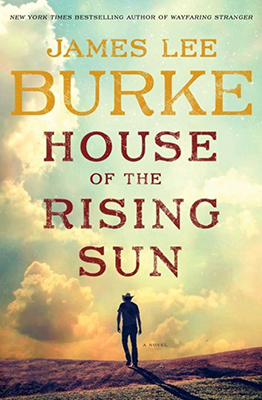 Michelle Newby is contributing editor at Lone Star Literary Life, reviewer for Foreword Reviews, freelance writer, member of the National Book Critics Circle, and blogger at www.TexasBookLover.com. Her reviews appear or are forthcoming in Pleiades Magazine, Rain Taxi, World Literature Today, South85 Journal, The Review Review, Concho River Review, Monkeybicycle, Mosaic Literary Magazine, Atticus Review, and The Collagist.
Michelle Newby is contributing editor at Lone Star Literary Life, reviewer for Foreword Reviews, freelance writer, member of the National Book Critics Circle, and blogger at www.TexasBookLover.com. Her reviews appear or are forthcoming in Pleiades Magazine, Rain Taxi, World Literature Today, South85 Journal, The Review Review, Concho River Review, Monkeybicycle, Mosaic Literary Magazine, Atticus Review, and The Collagist.
Lone Star Book Reviews
of Texas books appear weekly
at LoneStarLiterary.com
James Lee Burke
Simon & Schuster
Hardcover, 978-1-5011-0710-8 (also available as an audio book, an ebook, and on Audible), 448 pgs., $27.99
December 1, 2015
It’s 1916, Pancho Villa is raiding across the border, and Texas Ranger Hackberry Holland is searching for his long-lost son, Ishmael, a captain in the US Army, in Mexico, “a feral land, its energies as raw and ravenous as a giant predator that ingested the naïve and incautious.” Hackberry doesn’t find Ishmael this time, but he does run afoul of the Mexican Army and Arnold Beckman, an international arms dealer, escaping with a religious artifact that had been in Beckman’s possession, which may or may not be the Holy Grail.
House of the Rising Sun is an apocalyptic tale of addictions — alcohol, Morpheus, pain, love, power — which rob us of mercy, kindness, and human dignity. “I have nothing of value to impart,” Hackberry says. “My life has been dedicated to Pandemonium. That’s a place in hell John Milton wrote about. That also means I’m an authority on chaos and confusion and messing things up.”
While the action centers around Hackberry, the real stars of this tale are women: Maggie Basset, Hackberry’s wife, whose “decisions seemed made for her by someone else, perhaps a little girl who lived in a dark place inside her, a place where Maggie the adult would never go by herself”; Ruby Dansen, spirited union organizer, Ishmael’s mother, and Hackberry’s true love; and Beatrice DeMolay, the kind and cunning brothel owner who saves Hackberry’s life more than once.
House of the Rising Sun is drenched in gorgeous imagery. The Texas cottonwood leaves “trembled with the thinness of rice paper” and the lightning of an approaching storm “began as a flicker and then spread through thousands of miles of firmament in seconds and died inside an ocean of purple smoke.” Mexico is a place “where peasants wore depressions with their knees in the stone steps of seventeenth-century cathedrals, and where the light was harsher and brighter than it should have been and the colors were so vivid they jittered when you looked at them too long.”
As always, James Lee Burke’s dialogue is smart and sharp. “God sent you here to show us the fallacy of white superiority,” Hackberry says to his neighbor who has burned the cabins where his former slaves live. “Don’t hide your light under a basket. Many are called, but few are chosen.” The plot is simpler than it seems, allowing the characters and language to shine. The pace is even until, approaching the climax as the characters converge, Burke employs a very effective rapid-cycling technique between the narratives, conveying the urgency and speed of events as he rushes toward a resolution that is as satisfying as it is unexpected.
Disguised as crime novels and historical Westerns, Burke’s fiction is archetypal philosophy, combining classical Greek myth with the scope of biblical themes: the existence of evil, the will to violence and greed, the possibility of redemption, the impossibility of atonement, whether forgiveness can be earned or is a gift, and the nature of power. With its touches of magical realism, House of the Rising Sun will make you believe in portents.
* * * * *


